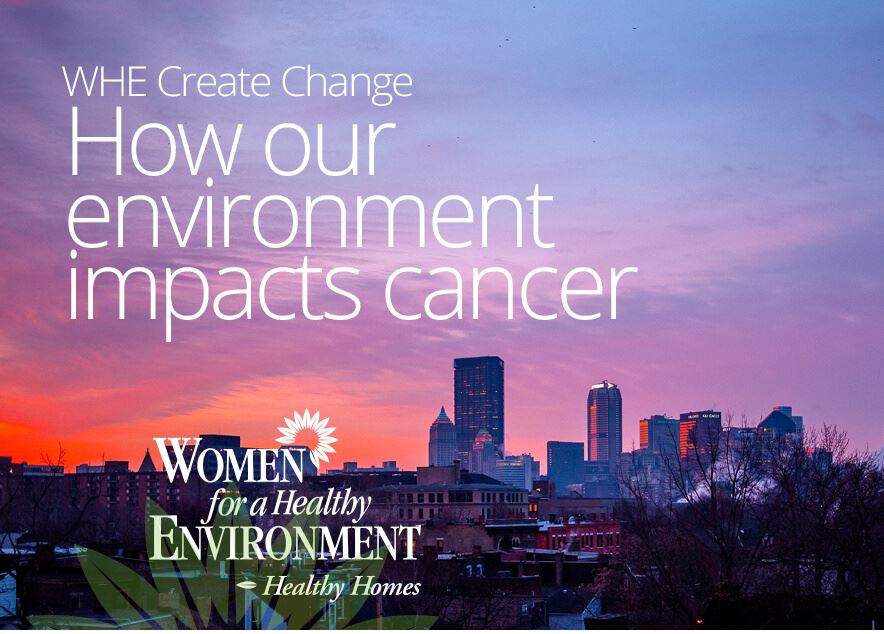The air we breathe, water we drink, food we eat, products we purchase and buildings we live in all impact our health.
As WHE recognizes World Cancer Day, we want to take a moment to shed light on the impact the environment and environmental exposures have on our health, specifically our risk for cancer. Changes to certain genes alter the way our cells function, causing cancer. Some of these genetic changes occur naturally when DNA is replicated during the process of cell division, while other genetic changes are the result of environmental exposures damaging DNA over time.
According to the National Institutes of Health, “Exposure to a wide variety of natural and man-made substances in the environment accounts for at least two-thirds of all the cases of cancer in the United States”. Moreover, the rate of children being diagnosed with cancer has increased by 34% since 1975. Since the greatest risk factor for cancer is age due to a reduction in overall bodily resiliency and the latent nature of cancer, this rise in childhood cancer is especially alarming and is reason to look further into environmental contributors.
Unfortunately, federal regulations and policies fall short when it comes to protecting consumers from harmful exposure to potentially carcinogenic chemicals and substances. There are about 40,000 chemicals active on the market and only a small fraction of them have been tested for safety and their effects on human health. These chemicals lurk in everyday items including furniture, cosmetics, household cleaners, toys and even food.
We know toxic emissions from local industrial point sources and diesel traffic expose Allegheny County residents to more air pollution than most other communities across the nation. In fact, Allegheny County ranks in the top 3% nationally for cancer risk associated with local industrial air pollution.
Several research studies have identified hundreds of chemicals contributing to cancer and Cancer Free Economy Network has compiled this list on the science:
- For breast cancer alone, more than 200 chemicals have been associated with mammary gland tumors in animal studies, and about half of these are chemicals women are routinely exposed to in their everyday lives.
- Air pollutants (like volatile organic compounds) have been shown to increase the risk of lung, bladder, liver, breast and other tumor types.
- Chemicals, including the now-familiar PFAS used in a variety of products including non-stick cookware, stain-resistant and waterproof fabrics and food packaging have been associated with testicular and kidney cancers.
- Organic solvents such as benzene are potent carcinogens, causing leukemia, non-Hodgkin’s lymphoma and multiple myeloma.
- The use of pesticides in agriculture, on school playing fields and at home in our own yards, has been associated with an increased risk of childhood cancers including leukemia and lymphoma.
- Formaldehyde is a known human carcinogen, yet companies continue to use it in building materials, textile finishes, nail polishes and even hair products.
- Widely-used flame retardants in consumer products have been linked with cancer, as well as hormone disruption and neurotoxicity.
Products containing carcinogens should not be readily available on shelves in-stores or online. While this information can be scary, overwhelming and daunting, there are resources for people to help make informed decisions about the products we buy and use in our spaces. In the absence of federal oversight and guidance, consumers can educate themselves and ‘vote with their dollars’ by choosing safer products.
WHE Resources
- Guide to Healthy Homes
- Environmental Work Group
- Healthy Building Network
WHE believes everyone should be able to live, grow, learn and play in a safe and healthy space. With these resources, families can take the first step to minimize exposure to potentially carcinogenic and hazardous chemicals, but we also need proactive policies to better protect our health and safety from toxic and carcinogenic chemicals and substances.





